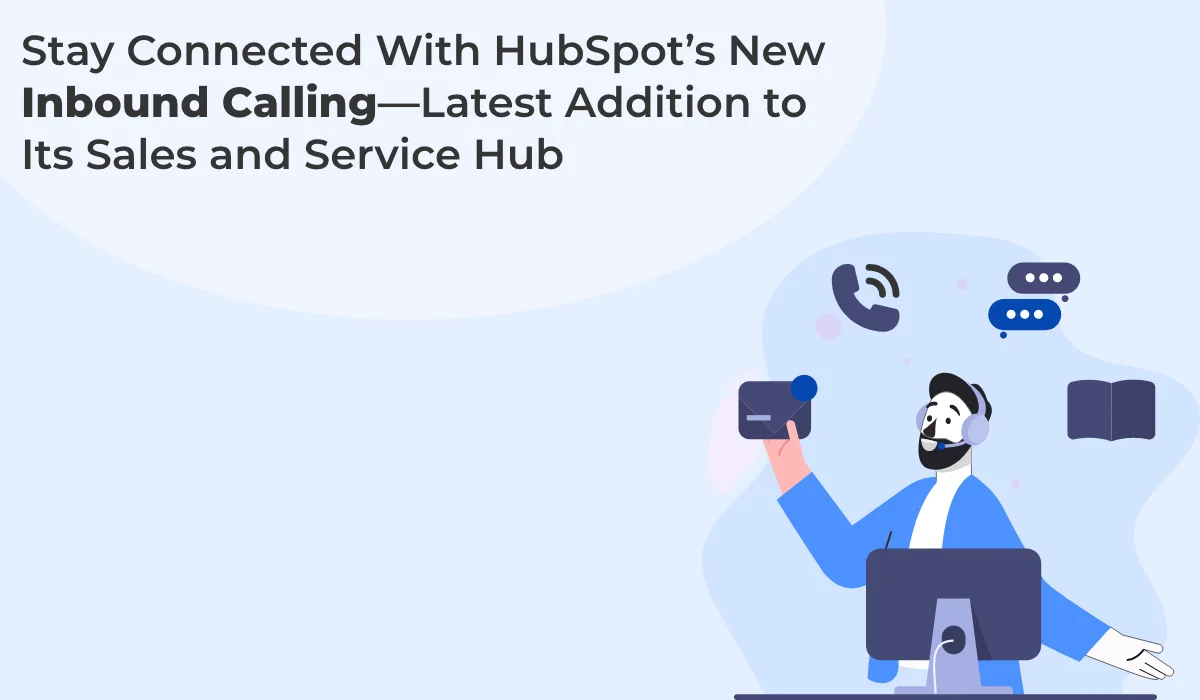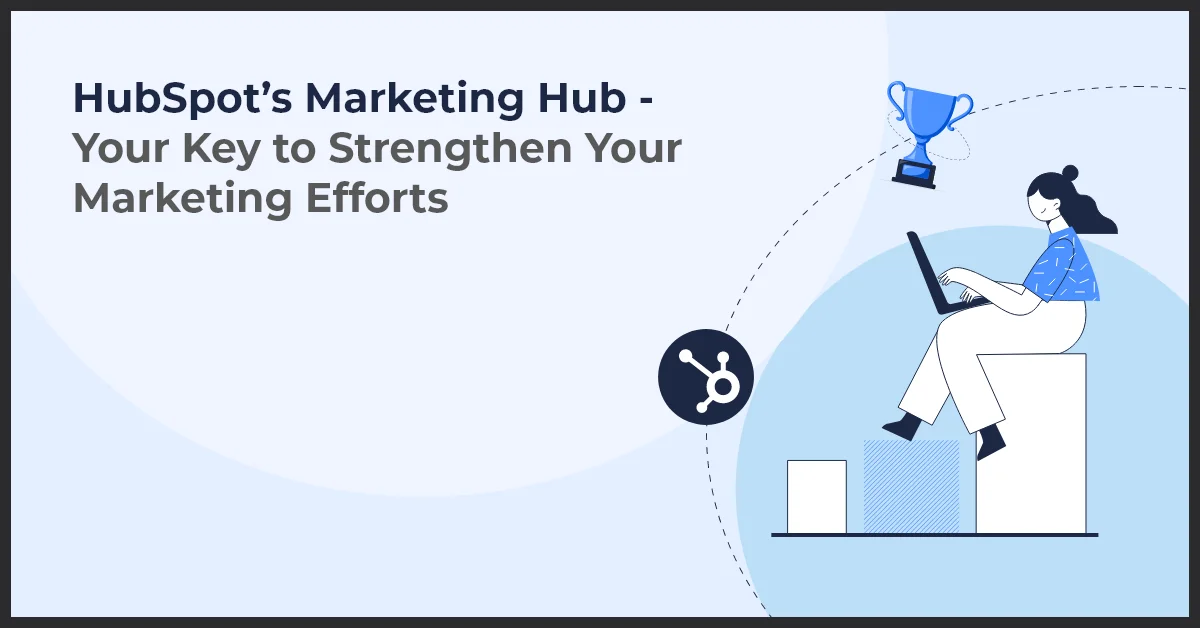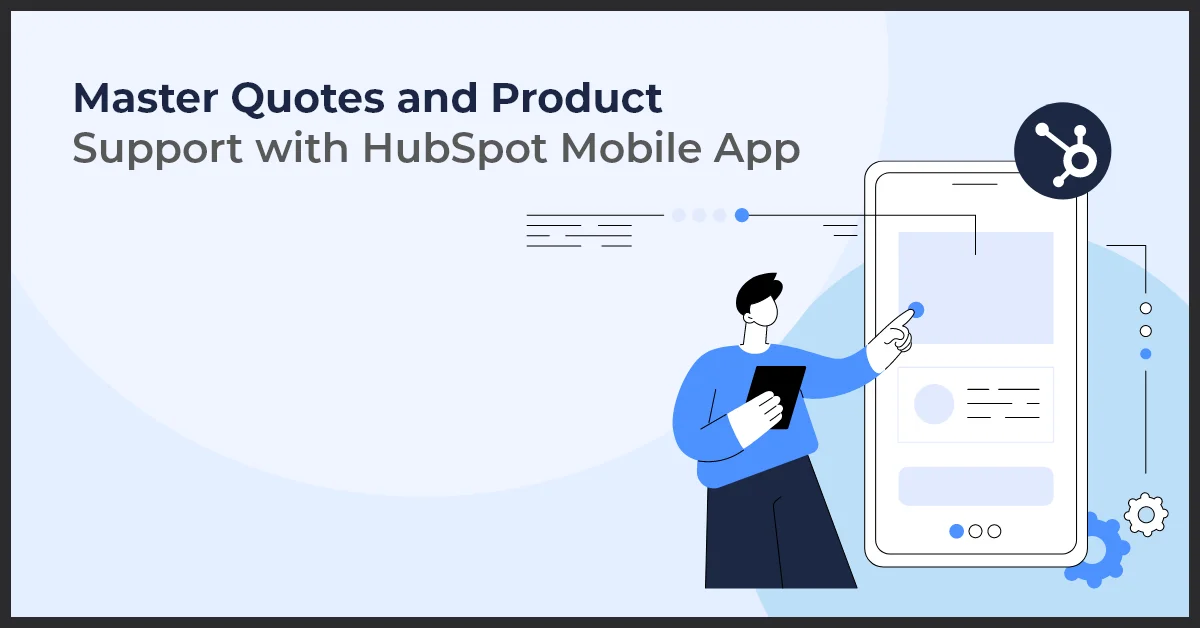Stay Connected With HubSpot’s New Inbound Calling—Latest Addition to Its Sales and Service Hub

Published on: July 1, 2022
Updated on: July 08, 2024
941 Views
- HubSpot
16 min read
Unlocking Efficiency: Discover the Power of HubSpot Calling
In today's fast-paced business environment, effective communication lies at the heart of success. Introducing HubSpot Calling — a game-changing concept that seamlessly integrates communication tools within a CRM system. This integration offers businesses an unparalleled opportunity to supercharge their sales and customer support processes.
HubSpot Calling revolutionizes the way businesses interact with their customers by merging crucial communication channels with a comprehensive CRM platform. This merger not only enhances efficiency but also fosters deeper customer relationships.
By harnessing the power of HubSpot Calling, businesses can witness a remarkable transformation in their operations. They gain access to a suite of tools that enable seamless calls, robust call tracking, and automated follow-ups — all within a unified system. This empowers sales and support teams to effortlessly handle client interactions, close deals, and provide top-notch customer service.
Don't miss out on the immense potential of HubSpot Calling. Embrace this groundbreaking concept and unlock a future where streamlined processes and satisfied customers are the norm.
HubSpot has made a significant stride in improving its Sales & Service Hub Professional, introducing features that, even though pretty fundamental, help solve major customer pain points. And that is excellent news for HubSpot customers and users.
For a quick recall, HubSpot has launched three features in the Professional SKU, including:
- Playbooks: To help create a repository of sales and service-related practices and resources that can be shared with teams.
- Conversation Intelligence: To help better coach your team and get visibility into customer conversation with real-time insights from call recordings and transcriptions.
- Inbound Calling: To help directly get calls from your contacts to a business phone number.
We have already talked about HubSpot Playbooks and Conversation Intelligence in our previous blog posts, and how these will benefit your business.
In this third and final blog post in the three series blog, we will look at the Inbound Calling feature, which HubSpot announced for its Sales and Service Hub Starter, Professional, and Enterprise in March 2022.
HubSpot made the Inbound Calling feature available with the US, the UK, and Canada phone numbers from May 02, 2022. Along with this, the company also made some changes to HubSpot Calling. Let’s take a look.
Inbound Calling allows you to receive calls from contacts in the CRM to a business phone number, which you can get from within HubSpot. Such powerful integration between CRM and phone systems can enhance customer experience and drive business growth. It gives you the flexibility to receive calls even when you are away from your laptop and eliminates the need to switch between apps to make and receive calls.
Key Features and Benefits of HubSpot Calling
- Seamless integration of VoIP and telephony systems with HubSpot CRM: HubSpot Calling allows for easy integration of VoIP (Voice over Internet Protocol) and telephony systems with the HubSpot CRM platform. This integration streamlines communication processes and enables efficient tracking and management of calls.
- Improved call management with call tracking and analytics: With HubSpot Calling, businesses can effectively manage calls by tracking and analyzing call data. This provides valuable insights into customer interactions, allowing for informed decision-making and improved sales and marketing strategies.
- Leveraging automation for sales and marketing processes: HubSpot Calling offers automation capabilities, enabling businesses to automate repetitive tasks and processes in their sales and marketing activities. This saves time, increases productivity, and ensures consistent follow-ups with prospects and customers.
- Enabling effective inbound and outbound calling strategies: HubSpot Calling supports both inbound and outbound calling strategies. It empowers businesses to engage with leads and customers through personalized phone conversations, helping build stronger relationships and driving revenue growth.
- Enhanced lead generation through conversational intelligence: By harnessing conversational intelligence, HubSpot Calling helps businesses generate high-quality leads. It analyzes phone conversations and provides valuable insights on customer needs, preferences, and pain points, enabling businesses to tailor their approach and increase conversion rates.
- Enriched customer relationship management and support capabilities: HubSpot Calling enhances customer relationship management by providing a comprehensive view of customer interactions. It enables businesses to provide exceptional customer support and nurture long-term relationships, leading to increased customer satisfaction and loyalty.
- Sales enablement and empowering sales teams with efficient tools: HubSpot Calling equips sales teams with efficient tools and functionalities, enabling them to sell more effectively. It provides features such as call scripts, call recording, call queues, and real-time analytics, empowering sales representatives to engage with prospects and close deals successfully.
Optimizing call center management through HubSpot Calling: HubSpot Calling offers features specifically designed for call center management. It provides call routing, monitoring, and reporting capabilities, optimizing call center operations and improving customer service efficiency.
Understanding HubSpot CRM and its Role in HubSpot Calling
HubSpot CRM is a powerful tool that plays a crucial role in the effectiveness of HubSpot Calling. Let's dive into understanding how HubSpot CRM integrates with HubSpot Calling and the benefits it brings.
Overview of HubSpot CRM features and functionalities
HubSpot CRM is a comprehensive customer relationship management system that helps businesses manage their interactions with leads and customers. It offers a range of features and functionalities such as:
- Centralized contact management: HubSpot CRM allows you to store all your contact information in one place, making it easy to access and update customer details.
- Deal management: The CRM enables you to track and manage deals from start to finish, giving you better visibility into your sales pipeline.
- Email integration: You can seamlessly integrate your email with HubSpot CRM, enabling you to track email interactions and have a complete view of communications.
- Task automation: HubSpot CRM automates repetitive tasks, such as data entry and follow-ups, freeing up your time to focus on building relationships and closing deals.
The role of CRM in facilitating effective communication and insights
A key role of HubSpot CRM in the context of HubSpot Calling is facilitating effective communication and providing valuable insights. With CRM, you can:
- Have a comprehensive view of customer interactions: HubSpot CRM allows you to view all customer interactions in one place, providing a holistic understanding of their engagement with your business.
- Track and analyze call data: By integrating HubSpot CRM with HubSpot Calling, you can track call outcomes, duration, and other metrics. This data helps you understand the effectiveness of your calling efforts and make data-driven decisions.
- Personalize calling interactions: With HubSpot CRM, you can access detailed customer information during calls, enabling you to provide personalized experiences and build stronger relationships.
Integrating calling capabilities to unlock the full potential of HubSpot CRM
When you integrate calling capabilities into HubSpot CRM, you unlock its full potential and enhance your calling experience. By leveraging features like:
- Click-to-call: With a simple click, you can make calls directly from HubSpot CRM, eliminating the need for manual dialing and streamlining your calling workflow.
- Call recordings: Integrated calling allows you to record and store call conversations within HubSpot CRM. These recordings can serve as valuable resources for training, compliance, and future reference.
- Automatic call logging: When a call is made or received, automatic call logging ensures that the details are logged in HubSpot CRM, saving you time and maintaining accurate records.
By integrating calling capabilities, you can maximize the efficiency of your calling efforts and leverage the full range of features offered by HubSpot CRM.
Getting Started with HubSpot Calling
Setting up HubSpot Calling and configuring your calling properties
Before you can start using HubSpot Calling, you need to set it up and configure your calling properties. Follow these steps to get started:
- Sign in to your HubSpot account and navigate to the calling settings.
- Click on the "Calling" tab and then select "Calling Configuration."
- Review and update your calling properties, such as your caller ID, voicemail greeting, and call recording settings.
- Save your changes to apply the new calling configuration.
Overview of necessary hardware and software requirements
Before you can make calls using HubSpot Calling, you need to ensure that you have the necessary hardware and software requirements. Here's what you'll need:
- A computer or laptop with a supported web browser.
- A stable internet connection with sufficient bandwidth.
- Headset or microphone and speakers for audio communication.
Linking your CRM data to enable seamless calling and tracking
One of the key benefits of HubSpot Calling is the ability to link your CRM data, which enables seamless calling and tracking. To link your CRM data, follow these steps:
- Go to the "CRM" tab in your HubSpot account.
- Select "Integration" from the dropdown menu.
- Click on "Connect" next to your CRM platform of choice (e.g., Salesforce, Microsoft Dynamics).
- Follow the on-screen instructions to authenticate and link your CRM data to HubSpot Calling.
Once you have completed these steps, you'll be ready to start making calls using HubSpot Calling and benefit from its seamless integration with your CRM data.
Exploring the Features of HubSpot Calling
5.1 Calls
- Initiating and receiving calls directly within HubSpot CRM
- Recording and storing call data for future reference and analysis
- Call forwarding, transferring, and conferencing options
5.2 HubSpot
- Integrating your existing HubSpot tools with HubSpot Calling
- Utilizing HubSpot's contact records and activity history during calls
5.3 Learn
- Leveraging HubSpot's training resources to master the features of HubSpot Calling
- Discovering best practices and tips for effective calling strategies
5.4 Property
- Understanding the essential properties and settings within HubSpot Calling
- Customizing calling properties to align with your specific business needs
5.5 Sales
- Enhancing sales processes with targeted calling strategies and automation
- Leveraging insights and analytics to optimize sales performance
5.6 CRM
- Integrating calling workflows seamlessly with CRM features
- Utilizing CRM data during calls to personalize interactions
5.7 Customer
- Enhancing customer support capabilities through HubSpot Calling
- Improving customer satisfaction and overall experience
5.8 Conversations
- Nurturing meaningful conversations with prospects and customers
- Utilizing chat tools and other conversational features within HubSpot Calling
5.9 Click
- Analyzing the impact of click-to-call features on conversion rates
- Implementing click-to-call strategies in marketing campaigns
5.10 Software
- Discussing third-party software integrations to enhance HubSpot Calling capabilities
- Exploring additional software tools that complement HubSpot Calling functionality
Best Practices for Effective HubSpot Calling
When it comes to HubSpot Calling, following best practices can make a significant difference in your call effectiveness and overall success. Here are some key strategies to consider:
Structuring personalized scripts for different call scenarios
One of the most important aspects of effective HubSpot Calling is personalization. Take the time to create tailored scripts for different call scenarios, considering the target audience, their pain points, and how your product or service can solve their problems. Personalized scripts can help build rapport, establish credibility, and increase the chances of a positive outcome.
Utilizing call tracking and analytics to optimize performance
Call tracking and analytics play a crucial role in improving your HubSpot Calling performance. By tracking key metrics such as call duration, conversion rates, and customer feedback, you can identify strengths and areas for improvement. Analyzing this data allows you to optimize your calling strategy, refine your scripts, and provide better customer experiences.
Adopting a consistent and efficient approach to inbound and outbound calling
Consistency is key when it comes to HubSpot Calling. Make sure your team follows a standardized approach for both inbound and outbound calls. This includes using a uniform tone, delivering consistent messaging, and adhering to established guidelines. A streamlined and efficient approach helps create a professional image and enhances customer satisfaction.
Tips for effective lead generation and nurturing through call interactions
HubSpot Calling can be a powerful tool for lead generation and nurturing. To maximize its effectiveness, focus on building rapport, actively listening to prospects, and addressing their needs. Take the opportunity to gather valuable information, qualify leads, and move them through the sales funnel. Effective lead generation and nurturing will lead to higher conversion rates and increased revenue.
Incorporating automation into your calling processes for increased efficiency
Automation can significantly enhance the efficiency of your HubSpot Calling initiatives. Consider using HubSpot's automation features to streamline repetitive tasks, such as lead assignment, follow-ups, and scheduling. By automating these processes, your team can focus more on engaging with prospects and providing personalized experiences.
Overcoming Challenges and Pitfalls in HubSpot Calling Implementation
Addressing common issues in call center management and telephony integration
Implementing HubSpot Calling in a call center environment can come with its own set of challenges. One common issue is managing a large volume of calls efficiently while maintaining a high level of customer service. HubSpot Calling provides features like call routing, call queues, and call recording to help streamline call center operations.
Another challenge is integrating telephony systems with HubSpot CRM. Smooth integration ensures that call data is properly logged and tracked, enabling seamless communication and efficient workflow. HubSpot Calling offers easy integration options with popular telephony providers, simplifying the setup process.
Mitigating hurdles faced during CRM and calling property setup
Setting up the CRM and calling properties correctly is crucial for a successful HubSpot Calling implementation. It's important to ensure that data fields are properly configured and mapped to capture relevant information during calls. Additionally, defining calling properties and categorizing them correctly helps in effective call tracking and analysis.
To overcome these hurdles, it is advisable to thoroughly review HubSpot's documentation and seek assistance from HubSpot experts if needed. Taking the time to set up the CRM and calling properties accurately will significantly contribute to a smooth calling experience.
Dealing with resistance and training challenges during adoption
Implementing a new system like HubSpot Calling often faces resistance from employees who are accustomed to existing workflows. It is important to address this resistance by showcasing the benefits, such as increased efficiency and improved customer experience, that come with HubSpot Calling. Conducting training sessions and providing comprehensive resources can help employees understand and embrace the new system.
Regularly communicating the positive outcomes of HubSpot Calling implementation and highlighting success stories from within the organization can also help alleviate resistance and encourage adoption.
Case Studies and Success Stories
In this section, we will explore real-life examples of businesses that have successfully leveraged HubSpot Calling to enhance their sales and customer support efforts.
Showcasing Real-Life Examples
Our case studies feature a variety of businesses, ranging from startups to larger enterprises, across different industries. These examples highlight how HubSpot Calling has helped them achieve their goals and drive growth.
- Company A: Learn how Company A, a software-as-a-service provider, tripled their sales conversion rates by implementing HubSpot Calling. Through personalized and timely communication, they were able to nurture leads effectively and close deals faster.
- Company B: Discover how Company B, an e-commerce retailer, improved their customer support experience using HubSpot Calling. By implementing the call tracking feature and integrating it with their CRM, they were able to provide more personalized and efficient support to their customers, resulting in higher customer satisfaction and increased retention rates.
- Company C: Explore how Company C, a B2B services provider, utilized HubSpot Calling to streamline their sales process. By automating call logging and notes within the CRM, they reduced manual data entry, saved time, and enabled their sales teams to focus more on building relationships and closing deals.
Demonstrating Measurable Results
These success stories not only showcase the effectiveness of HubSpot Calling but also provide measurable results and improvements achieved by the businesses:
- Increased sales conversion rates by 30%
- Reduced response time by 50% resulting in improved customer satisfaction
- Streamlined sales process, saving an average of 2 hours per sales representative per day
Through these case studies and success stories, you can gain insights into how HubSpot Calling can make a positive impact on your business.
Future Trends and Developments in HubSpot Calling
As technology continues to evolve, so does the world of sales and marketing. HubSpot Calling is no exception and is constantly evolving to adapt to these changes. Here are some future trends and developments to look out for:
Exploring advancements in AI-powered call analytics and data-driven insights
With the power of artificial intelligence (AI), HubSpot Calling is taking call analytics to new heights. AI algorithms can now analyze conversations, identify trends, and extract valuable insights from each call. This data-driven approach enables sales teams to make smarter decisions and drive better outcomes.
Predictive analytics and AI-enabled automation in HubSpot Calling
Imagine a world where HubSpot Calling can predict which leads are most likely to convert into customers. With predictive analytics, this becomes a reality. By analyzing historical data and customer behavior patterns, HubSpot Calling can automatically prioritize leads, optimize call workflows, and ultimately increase sales effectiveness.
Emerging technologies and their potential impact on HubSpot Calling capabilities
The future of HubSpot Calling is highly influenced by emerging technologies. From voice recognition and natural language processing to virtual reality and augmented reality, the possibilities are endless. These technologies have the potential to enhance the effectiveness and personalization of HubSpot Calling, providing a more immersive and tailored experience for both salespeople and customers.
With HubSpot’s Inbound Calling, you can:
- Get a new business phone number within HubSpot
- Make outbound calls
- Redirect inbound calls to your mobile device or other calling tools
- Take advantage of all inbound/outbound call records, transcriptions, and recordings available in the HubSpot CRM
While initially only the United States, the United Kingdom, and Canadian phone numbers will be available, HubSpot might add more countries to its list in the future. But it should not impact its users, as these phone numbers can be used for outbound and inbound calling by users from anywhere in the world.
In addition, HubSpot has also changed the pricing structure of HubSpot Calling.
Historically, the company used to have calling minute limits per user, which did not require a paid Sales or Service Hub seat.
From May 02, 2022, it has introduced flexibility in how businesses want to use these minutes. Now, users can share the calling minutes across the entire account and will need to pay for a Sales or Service Hub seat to use those minutes.
Here is a detailed look at the account-wide minute limits and the number of phone numbers based on tier:
- Sales or Service Hub Starter: 500 minutes per month and 1 HubSpot provided phone number
- Sales or Service Hub Professional: 3,000 minutes per month and 3 HubSpot phone numbers
- Sales or Service Hub Enterprise: 12,000 minutes per month and 5 HubSpot phone numbers
These feature updates are significant as now you can receive calls on your mobile phones while also leveraging Conversation Intelligence to analyze your interactions with contacts.
HubSpot intends to release more product updates in its Sales & Service Hub Professional Sales to help businesses grow better. It will provide a ton of documentation and training material on making the most of these features. So, be sure to check out the HubSpot Academy to learn more.
If you are interested in getting some hands-on HubSpot training or want to know if it is the right solution for your business, we are here for you! Just get in touch at info@growthnatives.com and our HubSpot certified professionals will get back to you.



